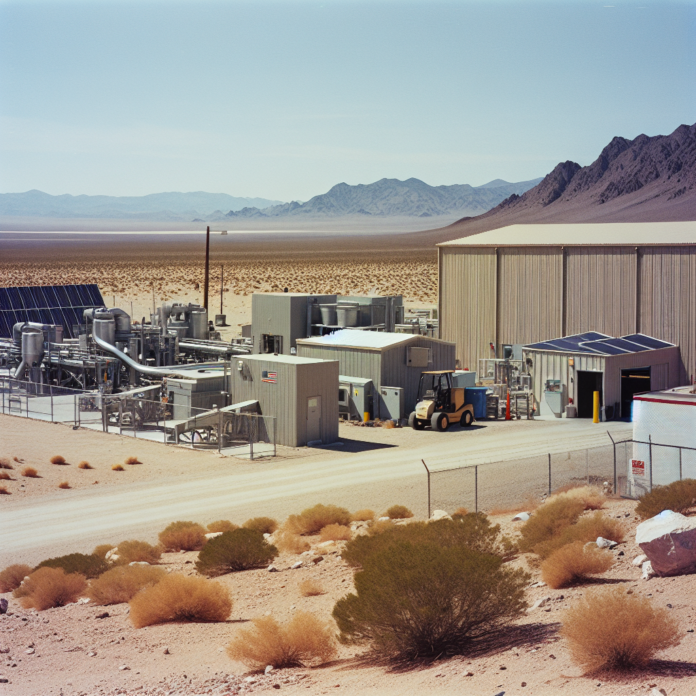American Battery Technology Company Expands Operations with Strategic Land Sale in McCarran, Nevada
Introduction: A Pivotal Move in Clean Energy Infrastructure
As the global transition to clean and sustainable energy continues to accelerate, American Battery Technology Company (ABTC) is taking bold strides to strengthen the U.S. domestic supply chain for critical battery materials. One of the company’s latest moves involves the sale of a significant plot of land in the Tahoe-Reno Industrial Center in McCarran, Nevada. The 12.44-acre land sale follows ABTC’s recent operational expansion and is a part of their broader strategy to streamline their production capabilities while opening the door for collaborative clean tech development in the region.
Understanding the McCarran Land Sale
Background and Strategic Importance
ABTC recently announced it had finalized the sale of 12.44 acres of land in McCarran, Nevada, for $5.26 million. This site, located within the sprawling and industrially significant Tahoe-Reno Industrial Center (TRIC), was originally intended for the company’s lithium-ion battery recycling operations. However, following changes in the company’s operational blueprint and a shift toward centralizing production near their new facilities, ABTC determined that this particular site was no longer necessary for their immediate needs.
Selling the land not only brings in new capital but also emphasizes a strategic pivot — the consolidation and optimization of operations in proximity to ABTC’s new recycling facility and headquarters in Fernley, Nevada.
Leveraging Real Estate for Clean Tech Growth
The Tahoe-Reno Industrial Center is a hub for innovation and sustainability. By selling the parcel within TRIC, ABTC is potentially paving the way for other clean technology firms or industrial players to enter the space, further widening the ecosystem of renewable energy and sustainable manufacturing in northern Nevada. Moreover, the funds generated will support ABTC’s accelerated production plans and investments into lithium and battery material processing.
American Battery Technology Company: Vision and Growth
Leading the Charge in Battery Recycling
The U.S. is rapidly scaling domestic battery supply chains in response to surging demand for electric vehicles (EVs), grid storage, and portable electronics. ABTC plays a critical role in this effort, offering a closed-loop battery recycling process that aims to extract valuable materials such as lithium, nickel, and cobalt in an environmentally benign manner.
Unlike traditional recycling methods that often rely on smelting or acid leaching, ABTC uses a proprietary hydrometallurgical system featuring low waste output and high recovery efficiency.
Key Facilities and Investments
The company’s main lithium-ion battery recycling facility in Fernley, Nevada, is part of its broader plan to deploy integrated systems that combine feedstock recycling and primary extraction of lithium from domestic hard rock and sedimentary sources. The facility is expected to process more than 20,000 metric tons of battery feedstock annually at full capacity.
In addition to recycling, ABTC is working on commercial-scale primary lithium-hydroxide production. This includes a pilot plant in Tonopah, Nevada, developed through a competitive Department of Energy (DOE) grant awarded to the company in partnership with DuPont and other research institutions.
The Clean Energy Transition and Domestic Supply Chain Security
Why Domestic Battery Materials Matter
As the clean energy sector grows, so does the demand for ethical and domestic sources of critical minerals. Presently, much of the world’s lithium and cobalt supplies are sourced from international locations, many of which pose environmental, ethical, and geopolitical concerns.
ABTC’s mission to “build battery metals infrastructure domestically and sustainably” aligns with the goals of the Inflation Reduction Act, which provides incentives for companies contributing to U.S.-based clean energy manufacturing. The land sale in McCarran is part of a larger effort to centralize and streamline operations, enabling greater self-sufficiency for the U.S. in the energy transition.
Supporting a Circular Economy
The shift toward lithium-ion battery recycling also promotes a circular economy that can reduce reliance on mining and other resource-intensive extraction methods. ABTC’s model supports reuse and regeneration, playing an essential role in creating a sustainable lifecycle for one of the most essential energy storage technologies of the 21st century.
By reducing waste and reclaiming raw materials from used electronics and EV batteries, the company leads the charge in maximizing the value of each mineral extracted while minimizing environmental impact.
Impacts on Nevada’s Clean Technology Hub
Northern Nevada’s Emerging Green Economy
Nevada has rapidly become a nucleus for battery manufacturing and clean energy investment, with Tesla’s Gigafactory, Redwood Materials, and now ABTC, weaving an integrated supply chain in the region. This regional synergy allows companies to benefit from shared infrastructure, workforce development, and innovation ecosystems.
The strategic location of the Tahoe-Reno Industrial Center ensures accessibility to highways, railroads, and logistical advantages that make it a key area for industrial-scale production and distribution.
Job Creation and Community Development
With economic diversification goals in mind, ABTC’s continued investment in northern Nevada supports high-skill job creation in battery technology, materials science, logistics, and environmental engineering. The capital unlocked from the land sale will likely feed back into ABTC’s operations and new hires as facilities scale up and new phases roll out.
Conclusion: A Strategic Acceleration Toward a Sustainable Future
The sale of the McCarran industrial site by American Battery Technology Company marks more than a financial transaction; it’s a calculated move in the company’s long-term blueprint to become a leading supplier of recycled and sustainably sourced battery materials. With the shift toward consolidating facilities and expanding primary lithium extraction, ABTC is positioning itself as a key contributor to the U.S.’ clean energy economy.
As demand for EVs and renewable energy continues to rise, investments in domestic battery infrastructure like those ABTC is making will be critical to national energy security, environmental sustainability, and economic resilience. The McCarran land sale will not only fuel ABTC’s next steps but potentially open doors for others dedicated to advancing clean tech innovations in one of the country’s most dynamic regions for green industry.


